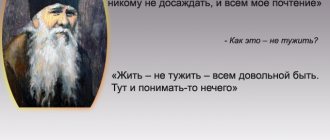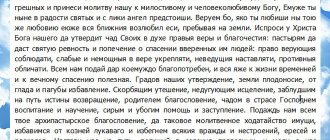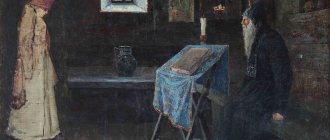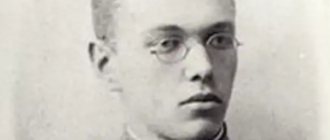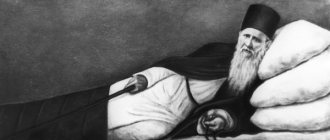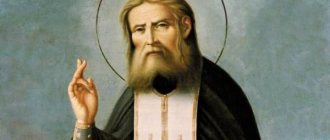Instructions and quotes from St. Luke of Voino-Yasenetsky
Remember that you need to leave the place where people are engaged in mocking, laughing, where they mock their neighbors. Leave, leave when you find yourself in such an unclean environment... Shut your ears and get away from these unfortunate scoffers and laughers... The roots of ingratitude are in human insatiability; no matter how much a person receives, everything is not enough for him, he does not thank, but grumbles for not receiving more... But those few who are always grateful for everything will receive great glory and honor, great grace from God. Know that every time you get angry, swear, or enmity against your loved ones, when evil and hatred boil in your heart, know that demons are at work in your heart. Know that every time you lie, slander, slander the good name of your neighbors, go to inform, try to cause harm to your neighbors - know that demons operate in the heart... Refrain, abstain, first of all, from what defiles you from your lips : from lies, curses, condemnation, from quarrels and gossip.
Refrain from this, and then your heart will gradually become more and more pure and pure, and little by little it will be transformed from a haven of demons into a temple of the Holy Spirit.
1. To know God means to know all-perfect, absolute love.
2. Prayer is the most important of all Christian deeds. All his other deeds are small and insignificant, completely insignificant compared to the work and labor of prayer.
3. Christ stands at the door of the heart of each of you and slowly, slowly knocks and waits to see if the door will open and let you in. And you just have to open the door for Him to come in and have supper with you.
4. Conscience is given by God to everyone, but it depends on a person whether to listen to the voice of conscience and follow it or drown out this voice.
5. God is close to us when we have constant communication with Him in prayer and acts of love.
6. For a life full of good deeds and mercy, the All-Righteous God will reward with glory, honor and peace even in this life, and first of all to the Jew, that is, to the one who knows God’s law, for his fidelity to this law and fulfillment of it.
7. There is the highest form of prayer - prayer without words, the cry of the soul to God, opening the heavens and bringing us into the most living communication with God.
8. Make it a rule to never remember your good deeds, completely forget about them. Always remember only your sins, your bad deeds. And then you will become humble, you will consider yourself more sinful than all people, and humility is the first and main virtue of a Christian.
9. Almsgiving has enormous, endless power.
10. The goal of life is perfection in love, in righteousness, and for this one must work tirelessly to cleanse one’s heart.
11. Prayer, which does not create visible miracles that amaze our minds, works miracles in the secret of human hearts.
12. Our mercy produces great gratitude to God in people far from Him.
13. Only unceasing prayer, like falling drops, softens hearts frozen without prayer.
14. To do anything good, truly good, we must be humble.
15. We must thank God when we are in weakness, in insults, in needs, in oppression for Christ, for then we are truly strong.
Saint Luke Voino-Yasenetsky (Luke of Crimea) - (1877-1961)
About Faith, Christ and Science. Thoughts and words of St. Luke (Voino-Yasenetsky)
Share
Saint Luke (Voino-Yasenetsky)
“The more I study nature, the more I stand in awe at the works of the Creator,” said biologist Louis Pasteur. And Isaac Newton, in addition to his famous scientific works, also wrote commentaries on the New Testament. The fact that faith and science not only do not contradict each other, but, on the contrary, are closely interconnected, was discussed a lot by a prominent domestic scientist, Doctor of Medical Sciences, Stalin Prize laureate, surgeon Valentin Feliksovich Voino-Yasenetsky, aka St. Luke of Crimea , Archbishop of the Russian Orthodox Church, glorified by her as a saint. The Nicaea publishing house collected the wise sayings of St. Luke on the topic of faith and science under one cover and published the collection “On Faith, Christ and Science. Thoughts and words of St. Luke of Voino-Yasenetsky.”
“You may know that the plane is able to lift you, but if you are not sure of this, you will never dare to get into it,” notes St. Luke and argues that knowledge in itself, without faith, without personal its acceptance by a person will remain for him just useless information. And therefore, knowledge is not stronger than faith, as many believe. On the contrary, it is faith that imparts power to knowledge.
The saint also reinforces his thoughts with quotations from the Gospel - for example, from the First Epistle of the Apostle Paul to the Corinthians: “Whoever loves God has been given knowledge from Him.” Archbishop Luke also finds this connection in well-known historical stories. For example, he recalls Johannes Guttenberg, who was eager to find a way to widely disseminate the Bible and... invented the printing press!
One of the saints closest to us in time, who lived in the mid-twentieth century, an intellectual and highly educated person, Saint Luke of Crimea, was able to reason logically about such a seemingly illogical phenomenon as faith. Persecuted in Soviet times for his church activities, he was interrogated more than once. At one of them, the investigator sarcastically asked the eminent surgeon how he could believe in God if he had never seen him. And Saint Luke (Voino-Yasenetsky) answered: “I operated a lot on the brain and, opening the skull, I never saw the mind or conscience there. Does this mean that they don’t exist?”
Since the time of Darwin, whose views Saint Luke reasonably criticizes, of course, much has changed. Not all modern scientists rely on the atheistic concept of the origin of the world, but on the contrary, they periodically present new hypotheses confirming the existence of the Creator. And for this, perhaps, we should not least say thanks to St. Luke Voino-Yasenetsky, whose thoughts and words “On Faith, Christ and Science” still provide rich food for thought.
Saint Luke of Crimea (Voino-Yasenetsky). About faith and unbelief
All the holy apostles did not immediately and with great difficulty believe that their Teacher, the Lord Jesus Christ, had risen from the dead. Even for them, who had seen Him resurrect the dead more than once, it was not easy to believe that a dead man, motionless and lifeless, in whom there was neither thought nor feeling, could resurrect himself. This is much more incomprehensible than the great miracle of the resurrection of the daughter of Jairus (see: Matt. 5:40–43) or the son of the widow of Nain (see: Luke 7:11–15). Later than everyone else, the Apostle Thomas believed in this. It was so difficult for him to comprehend the amazing fact of the Resurrection of the Lord Jesus Christ in his consciousness that he categorically declared: “I will not believe until I put my fingers into the wounds of the nails and my hand into the wound in His chest” (see. : John 20:25).
And so the Lord Jesus Christ came to His disciples and taught them peace. Turning to Thomas, He said: Come here, put your finger here and see My hands, reach out your hand and put it in My side, and do not be unfaithful, but faithful (John 20:27). With fear and trembling, St. invested. Thomas pressed his fingers into the wounds of Christ and with a great spiritual upsurge of faith exclaimed: My Lord and my God (John 20:28)! And I heard the answer: You believe because you have seen Me. Blessed are those who have not seen and yet have believed (John 20:29). Can these words of Christ be considered a reproach to St. Foma? Did the Lord condemn his unbelief? No, I didn’t condemn him at all. He knew his heart, knew that it was difficult for him to believe, and therefore made him feel His wounds.
Why is St. It was so difficult for Thomas to believe - more difficult than for the other disciples? To understand this, you need to think about how people generally relate to rumors, to everything new and unexpected. Gullible people accept every rumor without reasoning or criticism and easily believe everything. Serious and thoughtful people investigate, think about everything, and accept as truth only what stands up to criticism. There are also those who do not believe at all, who do not want to believe if they don’t like something, who willingly accept only what corresponds to their own desires, thoughts, moods, and stubbornly do not accept what is discordant with their ideas, contrary to their spiritual properties. Evil people do not want to believe anything good. Many did not believe in Christ and His Resurrection; it prevented them from living with their minds and their pride.
And therefore they rejected faith in Christ and the entire holy Gospel. And the third category of distrustful people includes skeptics who doubt everything.
Which of these three types of people did St. belong to? Thomas? Of course, not to the last two, not to those who do not accept anything sacred. He was one of those thoughtful and unfaithful people who wanted to be completely and accurately sure of everything. Is this a negative quality of the soul? Not at all. And the Lord Jesus Christ did not blame St. Thomas, but only, taking into account the fact that it was difficult for him to believe that his mind was critical, provided him with the opportunity to verify His Resurrection through touch.
Who are those who have not seen and believed (John 20:29), whom the Lord pleases? This is the countless multitude of Christians who lived and are now living by the power of the Resurrection of Christ, who believed with all their hearts in the Lord Jesus without seeing Him. Is it easy for us, without seeing the Lord Jesus Christ, to believe in Him? It was much easier than it was for the apostles, because since the Resurrection, His preaching of the Holy Gospel conquered the whole world, extinguished the evil fire of paganism and enlightened the pagan darkness. The light of Christ has shone upon the world. And we know by faith that the Lord lives and abides with His Father, and dwells in every pure heart that loves Him, and now He is among us, in the temple, and listens to our prayers.
But our faith is much weaker than the apostolic faith, although there is no doubt for us that Christ has risen; at the same time, it requires constant strengthening and warming. How can we strengthen our faith? How can we warm her up? By the fact that, like the Apostle Thomas, we will touch the wounds of Christ. After all, although we cannot put our fingers into them, we can mentally fall to these ulcers and strengthen our faith with spiritual touch.
Let us look with fear at the bloody hands of the Lord. After all, these are the hands that healed the blind with their touch (see: Matt. 12:22; Mark 10:46–52; Luke 18:35–42), raised up the paralytic (see: Matt. 8:6–13 ; 4:24; Mark 2:3–5, 10–12). These fingers were placed in the ears of a deaf and tongue-tied man and healed him (see: Mark 7:32–35). These palms touched the bed of the dead son of the widow of Nain - and death fled, and the spirit of life entered the dead man (see: Luke 7:11-15). These arms have opened to welcome all of us prodigals! These hands stretched out on the Cross to save us all from eternal damnation and death. It is they who hold the entire universe by their power, govern the life of the entire world and bless the entire earth from above. And these hands are nailed. How can our hearts not shudder at the thought of the most terrible atrocity, which even all the atrocities ever committed by people cannot be compared with! Let us fall to the hands of Christ and kiss them mentally.
Let's look at the feet of Christ. And they were nailed down. For what? Because the Lord walked throughout Palestine, preaching the gospel of the kingdom of God, calling for repentance, preaching the Gospel to the world. This sermon aroused the devilish anger of the scribes, Pharisees and high priests, for with His teaching and menacing denunciations the Lord was destroying their authority in the eyes of the Jewish people - a false, undeserved authority. And, inflamed with hatred, they decided to nail His feet so that they would never walk again. Shouldn't we fall at the feet of Christ in fear and trembling, just as the sinful harlot fell at them, washing them with her tears and wiping them with her hair and receiving forgiveness of sins (see: Luke 7:37-48)? How can we, burdened with sins no less than this harlot, not fall at the holy sores of the Lord’s feet, not wash them with tears of repentance and not ask with all our hearts for the forgiveness of sins, because for us, for our sins, the Lord was nailed to the Cross?
Let us turn our thoughts to the terrible wound on Christ’s chest, the wound from the spear with which His heart was pierced. From it flowed water and Blood (see: John 19:34), which washed away the sins of the whole world - that Blood that is now taught to us in the Sacrament of Communion. Let us approach the open heart of Christ. It is full of immeasurable Divine love, embracing the whole world, covering everything and purifying everything. Let us remember the words of the Lord spoken in the Temple of Jerusalem on the day of Mid-Pentecost: If anyone thirsts, let him come to Me and drink (John 7:37). Let us be saturated with the love of Christ, which flowed in an endless stream from His heart.
There were great people whose thoughts all the days of their lives were focused on the Cross of Christ. Who thinks with constant ardent love about the Cross of Christ? Only one who, like the Apostle Paul, can say: For me life is Christ (Phil. 1:21). Many saints could utter such words: the Monk Seraphim of Sarov, and Saints Demetrius of Rostov, Pitirim of Tambov, and many others. They all lived only by the Lord Jesus Christ.
In ancient times, the Gospel commandments and the preaching of Jesus lived in the hearts of people and guided their lives, the light of Christ enlightened the entire universe and many peoples were imbued with deep piety. Piety was great and ardent in Rus' at that time. In everything and always, in all matters: state, public, and personal, people were guided by the spirit of Christianity. For all their labors they called upon the blessing of Christ.
With the name of Christ on their lips they defeated terrible enemies, just as the noble Prince Dimitri Donskoy defeated the hordes of Mamai. People absorbed love for Christ and faith in Him with their mother's milk. The literature and art of those times were imbued with the spirit of Christ. Both artists and writers sacrificed great talents to the Lord Jesus and glorified Him with their words and brushes. Everything was covered in the spirit of Christian piety. The people knew how many martyrs shed their blood for the Lord Jesus Christ, and they understood that they could shed blood in this way only for the holy Truth, and they believed in this Truth. People saw many saints shining in the darkness of the world, like the stars of heaven, and bowed before the radiance of their souls. The Russian people went in huge crowds to worship the saints at the Kiev Pechersk Lavra, bringing love there and bowing their hearts, and from the saints of God who rested there, they drew strength in their faith.
Let us turn to the people among whom we live and ask: “What do you live for?” The scientist will answer: “I live by science.” And we object with embarrassment: “And that’s all? For you, only knowledge of nature is important, and the Lord Jesus Christ is nothing for you? And do you never remember the plagues of Christ?” - “I'm too busy to think about it.” Politicians will say: “We live to transform human life, to carry out reforms that will make it happy.” And we will complain: “Yes, this is a worthy task, but don’t you know that the Lord Jesus Christ, much earlier than you, already solved this problem in a way that none of you can solve. He showed the only way for life to be full of light.” But they, of course, will not agree with us and will continue to do their own thing. A simple person will say: “My life is about caring about my family, about my daily bread, about clothes.” And we will remind him: “Have you never heard that you should not worry about either your daily bread or clothing, because man cannot live by bread alone (Matthew 4:4; Luke 4:4) and God knows about everyone your needs, so that if you serve Him with all your heart, you won’t have to worry about tomorrow?”
Let's turn to the dark, gloomy corners of life and ask those people who eke out a miserable existence there: “What do you live for?” And some will answer: “My life is in vodka and tobacco,” others: “My life is in theft and murder.” This is the darkness and darkness in which these unfortunates live.
So, over time, more and more people appeared who tried their best to extinguish the light of Christ, and unbelief developed more and more among the people. Fierce, false criticism of the Gospel has appeared, and supposedly scientific theories have arisen that, at first glance, completely refute faith in God. Now it is becoming more and more difficult to acquire faith in Christ. But should we be discouraged and embarrassed? After all, people extremely easily follow the majority and accept what it believes and teaches. Already, few people observe fasting on the holy days of Holy Week, even on Good Friday, thinking that on this day the Lord was nailed to the Cross! How few are those who remember Christ, and how many are those about whom the Apostle Paul said a terrible word: If he who rejected the law of Moses, in the presence of two or three witnesses, is punished without mercy with death, then how grave do you think the punishment will be guilty of the one who tramples on the Son of God and does not consider as holy the Blood of the Covenant, by which he was sanctified, and insults the Spirit of grace (Heb. 10:28-29).
How many of our people have trampled Christ, disdained the Blood of Christ, even outraged this Blood! Will any of us really hear such a condemnation at the Last Judgment? Will any of us really die an eternal death for trampling on the Son of God, for not thinking about the Cross of Christ, for not worshiping him? It won't happen! May we turn with all our hearts to the wounded heart of Christ, may we receive holy love from this eternal source! He loves all who seek Him; He will give His grace to everyone who remembers His Cross and spiritually kisses it. Whoever loves Me will be loved by My Father, and I will love him and will appear to him Myself (John 14:21). He will appear to those who with ardent love always fall to His wounds and in spiritual delight, together with the Apostle Thomas, exclaim: My Lord and my God! And those who delve deeply into the Holy Gospel, whose hearts are illuminated by the grace of God, purified by long prayers and fasting, will retain the holy faith until the end of the world, for the Lord said that His Holy Church will not be overcome even by the gates of hell (see Matt. 16:18 ).
Let the words of our Lord Jesus Christ strengthen us: Do not let your hearts be troubled; believe in God and believe in Me (John 14:1). We will always remember them! Let our hearts not be troubled by anti-religious propaganda and the fact that the majority of the people have forgotten Christ. Let us follow Christ, let us believe in Him, never allowing doubt. And then the Lord Jesus Christ Himself will dwell in us with His Father and make His abode in us (see: John 14:23). Amen.
